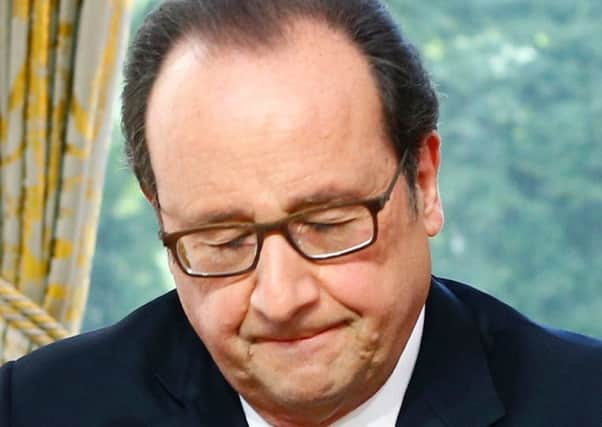Leaders: Francois Hollande needs to act | Police stop and search


No easy options, but Hollande needs to act
Both are signs of the significant political pressure now facing President Francois Hollande to do something about terrorism on French soil.
The attack in which Mohamed Lahouaiej-Bouhlel killed 84 people after driving a truck through a crowded Bastille Day celebration was the third major terrorist strike on the country in just 18 months.
Advertisement
Hide AdAdvertisement
Hide AdPrevious attacks, such as those in Paris last year, were so shocking that the French people had no other option than to grieve amid the horror.
Now, however, it appears that, as the attacks have become more frequent, grief has given way to anger – and the population is looking to its government for somewhere to lay the blame.
If President Hollande’s government wants to retain any kind of public support, it needs to be seen to take action – and quickly. The fact that he had to announce an extension of the state of emergency only a few hours before he had said it would come to an end only highlights the scale of the problem.
One idea being mooted – by Sarkozy, who has his own hopes of being reinstated as president, having been ousted by socialist Hollande after just one term – is that the French government should deport anybody who has been radicalised. This, however, is a measure which would actually achieve very little if it were to be implemented. In the case of the Nice attacker, would have done no good at all as he was not known to police for any kind of extremism.
France’s terrorism problem cannot be easily solved – tackling individual terrorists as well as groups such as Islamic State is difficult – yet Hollande has to be seen to act.
France has been singled out by IS leaders, although the threat is real to almost all European nations and many others throughout the world. And it’s not as though there is a shortage of other major political headaches in Europe right now.
The biggest is the situation in Turkey, where President Recep Tayyip Erdogan looks set to round up all the people who are against him following the attempted coup at the weekend. Doing so will, however, create even more divisions in his already divided country.
Closer to home is the fraught business of how Britain is to extricate itself from the European Union. Although Brexit talks undoubtedly have to get underway, what we should be doing is trying to keep relations as stable and amicable as possible.
Advertisement
Hide AdAdvertisement
Hide AdBrexit isn’t the biggest issue at the moment in the European Union: the most immediate problem is how Europe reacts to the terror threat. Britain’s Brexit negotiators need to remember this.
Britain needs to handle Brexit negotiations sensitively and be circumspect in its talks with Europe – there is a lot at stake in the current situation.
Searching questions for police
The Law Society of Scotland has spoken out against giving police officers the right to stop and search children for alcohol, saying it could alienate young people. It is right.
Non-statutory or “consensual” stop and search was stopped at the end of last year after it emerged than many children had been searched without any legal cause. The Law Society’s response to a consultation into potentially reinstating police powers to search children for alcohol should be listened to.
Firstly, doing so could fracture further the relationship between Police Scotland and the country’s young people.
Secondly, it may not be illegal for many youngsters carrying alcohol to do so.
While young people are not allowed to buy alcohol in an off-licence or pub until they are 18, in Scotland, if a 16- or 17-year-old is eating a meal in a licensed premises, they are allowed to buy beer or cider. Meanwhile, it is only a criminal act to give alcohol at home to a child if they are under five – and a child drinking alcohol at home, or possessing it outside the home as long as they are not consuming it, is not breaking the law.
The argument that police should be allowed to search a young person suspected of carrying alcohol is that drinking often leads to other crime and anti-social behaviour. Perhaps, but there is something more fundamental at stake.
Advertisement
Hide AdAdvertisement
Hide AdThere is no doubt that the law surrounding children and alcohol needs to be tightened up and clarified. However, that is no grounds for reinstating a practice which could prove detrimental to building bridges between the law and the teenage population.